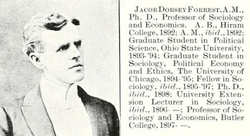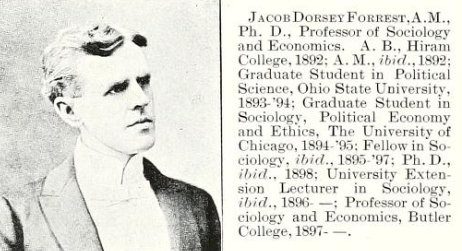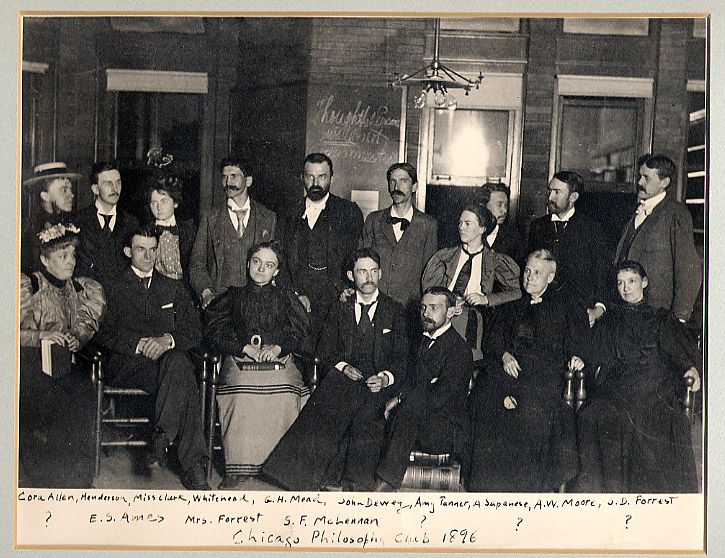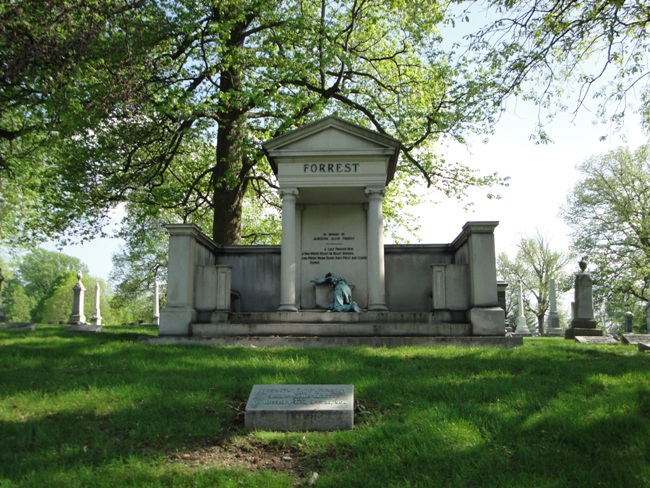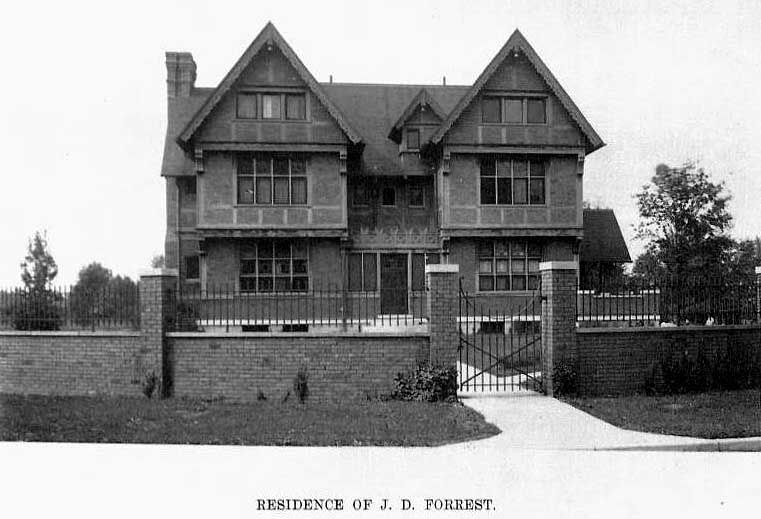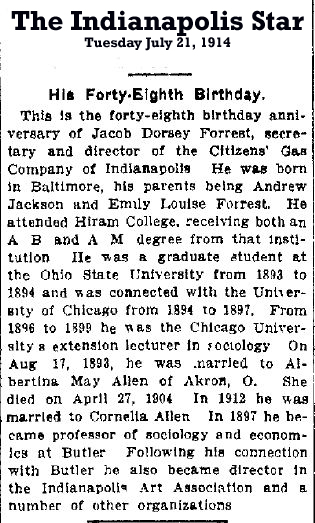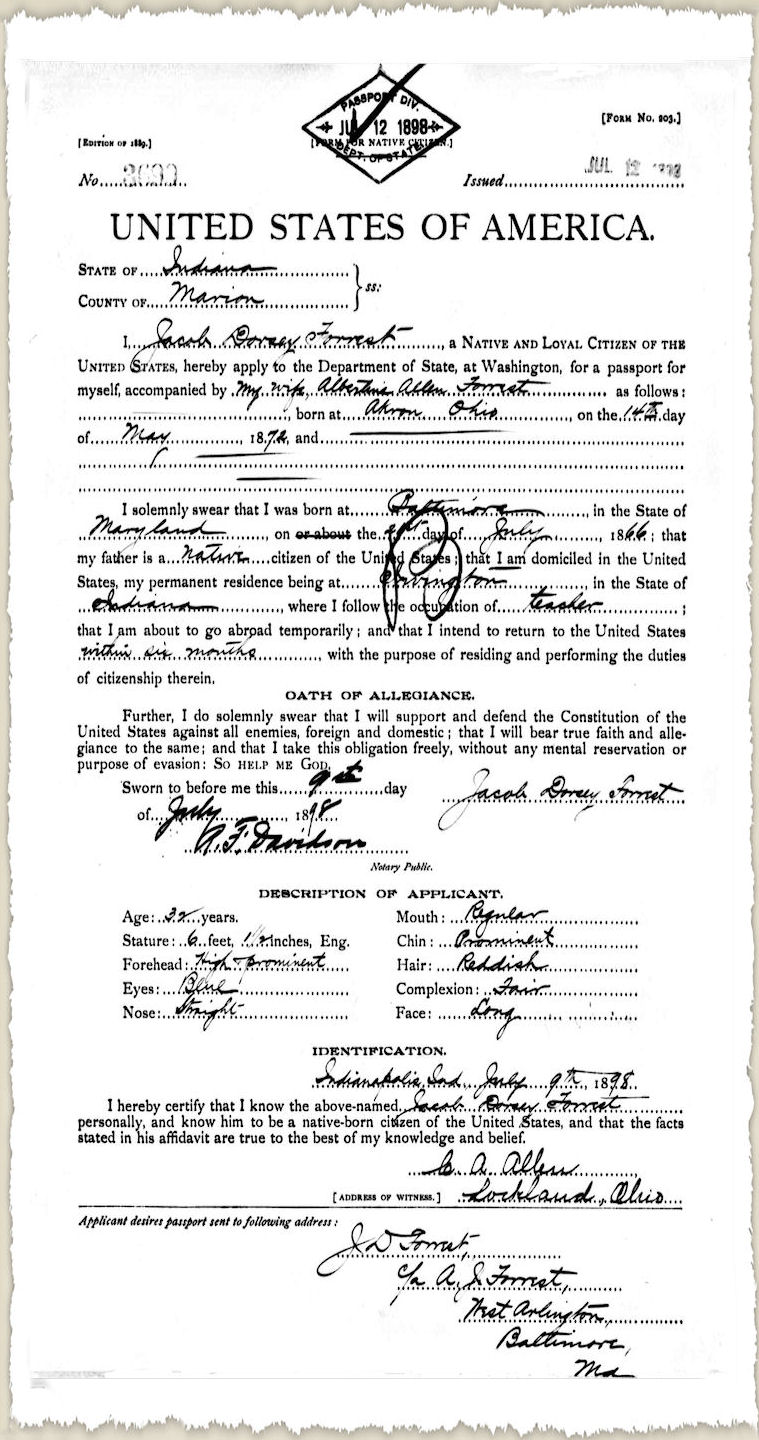The Development of Western Civilization by J. Dorsey Forrest, Ph. D., Professor of Sociology and Economics in Butler College, published by the University of Chicago Press, 1907, was dedicated:
"TO HER from whose too brief companionship the preparation of these pages cut off so many precious hours."
HER was his wife, Albertina, who passed away unexpectedly while they were vacationing in Seabreeze, Florida in 1904.
From the Butler University Special Collections, Rare Books, and University Archives, 1904 Butler Drift (yearbook):
Jacob Dorsey Forrest, A.M., Ph.D.
Professor of Sociology and Economics
A.B., Hiram College , 1892; A.M., ibid., 1892. Graduate Student in Political Science, Ohio State University, 1893-'94. Graduate Student in Sociology, Political Economy and Ethics, University of Chicago, 1894-'95. Fellow in Sociology, ibid., 1895-'97; Ph.D., ibid., 1900; University Extension. Lecturer Sociology, ibid., 1890-'99; Professor of Sociology and Economics, Butler College, 1897-[1907].
Following is an excerpt from Indiana and Indianans: A History of Aboriginal and Territorial Indiana and the Century of Statehood, Volume V by Jacob Piatt Dunn, © 1919 The American Historical Society, Chicago and New York:
J. Dorsey Forrest, corporation executive and farmer, was formerly a professor in Butler College at Indianapolis, but for the past ten years has been actively identified with the organization and general management of the Citizens Gas Company of that city. Mr. Forrest has become widely known both in the field of scholarship and in business and technical affairs, and is one of the few practical business men of Indianapolis who may write the degree Doctor of Philosophy after his name.
Mr. Forrest was born at Baltimore, Maryland, July 21, 1866, son of Andrew J. and Emily Louise (Dorsey) Forrest. He has an interesting ancestry. He is a direct descendant of that Thomas Forrest who, as a member of the London Company, which colonized Virginia, migrated to that colony in 1608 with his entire family and was the first settler at Jamestown to bring his family with him. After Bacon's Rebellion, in which the Forrests sided with Bacon, one branch of the family migrated to Maryland and the other to Gloucester, Virginia, in order to avoid persecution from Governor Berkeley. It is from the Gloucester County branch of the family that the Baltimore Forrests are descended. Mr. Forrest's grandfather, Jacob Forrest, was a native of Baltimore, but of Virginia parentage.
Andrew J. Forrest, who was born in Baltimore in 1839, was a mechanical engineer. He died in Baltimore late in 1918. At the outbreak of the war between the states, he went to Virginia to enter the Confederate Army, but on account of shortage of munition plants and workers in the South, was early withdrawn from army duty and assigned to the manufacture of cannon at the Tredegar Iron Works and later to the manufacture of rifles at an arsenal in Wilmington, North Carolina. For a short time, he was in the Confederate Navy and did a great deal of that hazardous work known as blockade running. He operated from Wilmington, Charleston and Galveston to Nassau, Bermuda and England. Three times he was captured by Federal cruisers but exchanged or released through efforts of the British ambassador after short periods in prison. After the war, he returned to Baltimore and was in the sugar refining business until 1877, after which he was connected with numerous enterprises as an engineer, including the city water department.
His wife, Emily Louise Dorsey, was born in Baltimore in 1838. Her father, William Dorsey, was born in England, being brought to Baltimore by his parents when a small boy. He was a builder in Baltimore until the war of 1861-65, when he entered the Confederate Army and rose to the rank of colonel. Following the war he settled in Western Virginia, where he lived until his death. Emily Louise Dorsey's mother died when she was a child, and her girlhood was spent with an aunt at Providence, Rhode Island. She returned to Baltimore about 1858, was married there in 1864, and left immediately for Nassau, Bahama Islands, which had become her husband's headquarters while in the blockade running service. At the close of the war she returned to Baltimore and is still living in that city.
J. Dorsey Forrest secured his early education in the common schools of Baltimore and the Baltimore City College. From 1881, when he was fifteen years of age, until 1888, he was connected with the brick manufacturing business at Baltimore, but left that to enter Hiram College, near Cleveland, Ohio, and remained to complete the course and receive his A.B. degree in 1892. During 1893 he was a graduate student in the Ohio State University, and from 1894 to 1897 was a graduate student and fellow in sociology at the University of Chicago. His degree of Doctor of Philosophy was awarded him by the University of Chicago in 1899. One of the products of his scholarship is his work entitled "The Development of Western Civilization," published in 1905 by the University of Chicago Press and Cambridge (England) University Press.
On leaving the University of Chicago Mr. Forrest became Professor of Sociology and Economics in Butler College, Indianapolis, holding that chair from 1897 to 1907. In the latter year he obtained a leave of absence in order to take charge of the Citizens Gas Company. He soon found it necessary to devote his entire attention to the Gas Company and resigned from the college faculty in 1909. He has since been secretary and general manager of the Gas Company, and its responsible executive from the time of its organization. The Citizens Gas Company operates by-product coke ovens as the chief source of gas supply, and its business in coke and by-products is much greater than its gas business. Early in 1916 Mr. Forrest undertook to expand the business by recovering and refining benzol products in order to supply the Allies with explosives. The company supplied materials for high explosives to Great Britain, France, Russia and Italy, and later to the United States. Its activities thus extended to all the battle fronts long before the United States entered the war. Through the management of that important public utility he has rendered perhaps his chief public service to the city. In 1918 the Milburn By-Products Coal Company was incorporated in West Virginia, to provide a portion of the coal required by the Citizens Gas Company of Indianapolis, and Mr. Forrest became president of that company. Mr. Forrest also owns and operates a large farm near Warrenton, Virginia.
Mr. Forrest has never been in politics and has never held an elective office. He was active in many movements of the purpose of bringing the United States to support the Allies in the European war and was a member of the coke committee of the Council of National Defense until the council was superceded [sic] by various governmental agencies. Mr. Forrest has been an independent in politics.
He is a member of the American Economic Association, American Sociological Society, American Gas Institute, By-Product Coke Producers' Association, American Saddle-Horse Breeders' Association, Indianapolis Literary Club, University Club, Woodstock Club, Contemporary Club and of the Disciples of Christ Church. These various organizations indicate some rather unusual interests and activities.
Mr. Forrest married Cordelia Kautz, daughter of J.A. and Inez (Gillen) Kautz of Kokomo, Indiana. Her father is publisher of the Kokomo Tribune. They have one child, a daughter.
His obituary from the November 7, 1930 Kokomo Tribune (Kokomo, Indiana) Evening Edition:
J. D. FORREST DIES AT HOME IN EVANSTON
Word Received by Father-in-Law, J. A. Kautz, Early Friday
MAN OF UNUSUAL GIFTS
Formerly on Faculty of Butler College — Resided Here Brief Time Several Years Ago
J. Dorsey Forrest, age sixty-four, an official of the Inter-Lake Iron Corporation, Chicago, a son-in-law of J. A. Kautz, publisher of the Tribune, died at his home, 2222 Orrington Avenue, Evanston, Illinois, at 1 o'clock Friday morning. Death resulted from progressive paralysis, with which Mr. Forrest had been afflicted several months.
Funeral services will be held at the home in Evanston, Saturday afternoon at 2 o'clock. Burial will take place in Crown Hill Cemetery, Indianapolis, Monday afternoon. Mr. and Mrs. Kautz and Mrs. Kent H. Blacklidge, that latter a sister of Mrs. Forrest, left for Evanston early Friday forenoon. They had been expecting the summons as Mr. Forrest had been in a critical condition several days. They received information Thursday evening that the end was approaching.
Mr. Forrest back in his student days in Chicago University, was supply minister for a short period at the Main Street Christian Church here during which time he resided in Kokomo. That was about thirty-five years ago. Later he removed to Indianapolis, where he became a member of the faculty of Butler College, holding the chair of sociology. That connection he maintained for several years.
In 1907, when the Citizens Gas Company of Indianapolis was organized, Mr. Forrest became its general manager serving in that capacity until 1923. For two or three years thereafter he owned and operated a farm near Warrenton, Virginia. In the meantime he formed the Chicago business already mentioned and eventually took up residence in Evanston.
Mr. Forrest was born in Baltimore, Maryland, July 21, 1866, eldest son of Andrew J. and Emily Dorsey Forrest, life-long residents of that city. Of studious bent from early childhood, he was still a youth when he completed public school studies in Baltimore and entered Hiram College, Ohio. He acquired A.B. and A.M. degrees from that institution. Later work in Chicago University obtained for him a Ph.D. degree. In 1915 Mr. Forrest was united in marriage with Cordelia Kautz, a daughter of Mr. and Mrs. J. A. Kautz, Kokomo, who with two daughters Cecily, thirteen, and Cordelia, eleven, survives him. Other survivors are four brothers, William M. Forrest of the University of Virginia, Edwin Forrest of the Baltimore city schools, Charles N. Forrest of Rahlway, New Jersey, and Robert L. Forrest of Annapolis, Maryland.
Possessing a mind of keenness and brilliance, trained and disciplined by study and research, Mr. Forrest was a man of extraordinary intellectual stature. His gift for clear, analytical thinking on any subject to which he addressed himself, whether in the realm of culture or the realm of business, was remarkable. Coupled with this was an unusual power of clarity of expression which made him impressive in both spoken and written discourse.
While predominantly a thinker, Mr. Forrest had social qualities of a high order, and a marked capacity for acquiring and keeping friends. In his home he radiated cheerfulness and always had the interest, affection and understanding of the devoted husband and father. Those in bereavement have the consolation of countless memories of a character richly gifted and unfailingly tender, high and fine.
The bereavement is the second that has come within the twelve-month to the family of the publisher of the Tribune. Another son-in-law, Kent H. Blacklidge, lost his life in an automobile accident at Valdosta, Georgia on February 18, last.
The Development of Western Civilization by J. Dorsey Forrest, Ph. D., Professor of Sociology and Economics in Butler College, published by the University of Chicago Press, 1907, was dedicated:
"TO HER from whose too brief companionship the preparation of these pages cut off so many precious hours."
HER was his wife, Albertina, who passed away unexpectedly while they were vacationing in Seabreeze, Florida in 1904.
From the Butler University Special Collections, Rare Books, and University Archives, 1904 Butler Drift (yearbook):
Jacob Dorsey Forrest, A.M., Ph.D.
Professor of Sociology and Economics
A.B., Hiram College , 1892; A.M., ibid., 1892. Graduate Student in Political Science, Ohio State University, 1893-'94. Graduate Student in Sociology, Political Economy and Ethics, University of Chicago, 1894-'95. Fellow in Sociology, ibid., 1895-'97; Ph.D., ibid., 1900; University Extension. Lecturer Sociology, ibid., 1890-'99; Professor of Sociology and Economics, Butler College, 1897-[1907].
Following is an excerpt from Indiana and Indianans: A History of Aboriginal and Territorial Indiana and the Century of Statehood, Volume V by Jacob Piatt Dunn, © 1919 The American Historical Society, Chicago and New York:
J. Dorsey Forrest, corporation executive and farmer, was formerly a professor in Butler College at Indianapolis, but for the past ten years has been actively identified with the organization and general management of the Citizens Gas Company of that city. Mr. Forrest has become widely known both in the field of scholarship and in business and technical affairs, and is one of the few practical business men of Indianapolis who may write the degree Doctor of Philosophy after his name.
Mr. Forrest was born at Baltimore, Maryland, July 21, 1866, son of Andrew J. and Emily Louise (Dorsey) Forrest. He has an interesting ancestry. He is a direct descendant of that Thomas Forrest who, as a member of the London Company, which colonized Virginia, migrated to that colony in 1608 with his entire family and was the first settler at Jamestown to bring his family with him. After Bacon's Rebellion, in which the Forrests sided with Bacon, one branch of the family migrated to Maryland and the other to Gloucester, Virginia, in order to avoid persecution from Governor Berkeley. It is from the Gloucester County branch of the family that the Baltimore Forrests are descended. Mr. Forrest's grandfather, Jacob Forrest, was a native of Baltimore, but of Virginia parentage.
Andrew J. Forrest, who was born in Baltimore in 1839, was a mechanical engineer. He died in Baltimore late in 1918. At the outbreak of the war between the states, he went to Virginia to enter the Confederate Army, but on account of shortage of munition plants and workers in the South, was early withdrawn from army duty and assigned to the manufacture of cannon at the Tredegar Iron Works and later to the manufacture of rifles at an arsenal in Wilmington, North Carolina. For a short time, he was in the Confederate Navy and did a great deal of that hazardous work known as blockade running. He operated from Wilmington, Charleston and Galveston to Nassau, Bermuda and England. Three times he was captured by Federal cruisers but exchanged or released through efforts of the British ambassador after short periods in prison. After the war, he returned to Baltimore and was in the sugar refining business until 1877, after which he was connected with numerous enterprises as an engineer, including the city water department.
His wife, Emily Louise Dorsey, was born in Baltimore in 1838. Her father, William Dorsey, was born in England, being brought to Baltimore by his parents when a small boy. He was a builder in Baltimore until the war of 1861-65, when he entered the Confederate Army and rose to the rank of colonel. Following the war he settled in Western Virginia, where he lived until his death. Emily Louise Dorsey's mother died when she was a child, and her girlhood was spent with an aunt at Providence, Rhode Island. She returned to Baltimore about 1858, was married there in 1864, and left immediately for Nassau, Bahama Islands, which had become her husband's headquarters while in the blockade running service. At the close of the war she returned to Baltimore and is still living in that city.
J. Dorsey Forrest secured his early education in the common schools of Baltimore and the Baltimore City College. From 1881, when he was fifteen years of age, until 1888, he was connected with the brick manufacturing business at Baltimore, but left that to enter Hiram College, near Cleveland, Ohio, and remained to complete the course and receive his A.B. degree in 1892. During 1893 he was a graduate student in the Ohio State University, and from 1894 to 1897 was a graduate student and fellow in sociology at the University of Chicago. His degree of Doctor of Philosophy was awarded him by the University of Chicago in 1899. One of the products of his scholarship is his work entitled "The Development of Western Civilization," published in 1905 by the University of Chicago Press and Cambridge (England) University Press.
On leaving the University of Chicago Mr. Forrest became Professor of Sociology and Economics in Butler College, Indianapolis, holding that chair from 1897 to 1907. In the latter year he obtained a leave of absence in order to take charge of the Citizens Gas Company. He soon found it necessary to devote his entire attention to the Gas Company and resigned from the college faculty in 1909. He has since been secretary and general manager of the Gas Company, and its responsible executive from the time of its organization. The Citizens Gas Company operates by-product coke ovens as the chief source of gas supply, and its business in coke and by-products is much greater than its gas business. Early in 1916 Mr. Forrest undertook to expand the business by recovering and refining benzol products in order to supply the Allies with explosives. The company supplied materials for high explosives to Great Britain, France, Russia and Italy, and later to the United States. Its activities thus extended to all the battle fronts long before the United States entered the war. Through the management of that important public utility he has rendered perhaps his chief public service to the city. In 1918 the Milburn By-Products Coal Company was incorporated in West Virginia, to provide a portion of the coal required by the Citizens Gas Company of Indianapolis, and Mr. Forrest became president of that company. Mr. Forrest also owns and operates a large farm near Warrenton, Virginia.
Mr. Forrest has never been in politics and has never held an elective office. He was active in many movements of the purpose of bringing the United States to support the Allies in the European war and was a member of the coke committee of the Council of National Defense until the council was superceded [sic] by various governmental agencies. Mr. Forrest has been an independent in politics.
He is a member of the American Economic Association, American Sociological Society, American Gas Institute, By-Product Coke Producers' Association, American Saddle-Horse Breeders' Association, Indianapolis Literary Club, University Club, Woodstock Club, Contemporary Club and of the Disciples of Christ Church. These various organizations indicate some rather unusual interests and activities.
Mr. Forrest married Cordelia Kautz, daughter of J.A. and Inez (Gillen) Kautz of Kokomo, Indiana. Her father is publisher of the Kokomo Tribune. They have one child, a daughter.
His obituary from the November 7, 1930 Kokomo Tribune (Kokomo, Indiana) Evening Edition:
J. D. FORREST DIES AT HOME IN EVANSTON
Word Received by Father-in-Law, J. A. Kautz, Early Friday
MAN OF UNUSUAL GIFTS
Formerly on Faculty of Butler College — Resided Here Brief Time Several Years Ago
J. Dorsey Forrest, age sixty-four, an official of the Inter-Lake Iron Corporation, Chicago, a son-in-law of J. A. Kautz, publisher of the Tribune, died at his home, 2222 Orrington Avenue, Evanston, Illinois, at 1 o'clock Friday morning. Death resulted from progressive paralysis, with which Mr. Forrest had been afflicted several months.
Funeral services will be held at the home in Evanston, Saturday afternoon at 2 o'clock. Burial will take place in Crown Hill Cemetery, Indianapolis, Monday afternoon. Mr. and Mrs. Kautz and Mrs. Kent H. Blacklidge, that latter a sister of Mrs. Forrest, left for Evanston early Friday forenoon. They had been expecting the summons as Mr. Forrest had been in a critical condition several days. They received information Thursday evening that the end was approaching.
Mr. Forrest back in his student days in Chicago University, was supply minister for a short period at the Main Street Christian Church here during which time he resided in Kokomo. That was about thirty-five years ago. Later he removed to Indianapolis, where he became a member of the faculty of Butler College, holding the chair of sociology. That connection he maintained for several years.
In 1907, when the Citizens Gas Company of Indianapolis was organized, Mr. Forrest became its general manager serving in that capacity until 1923. For two or three years thereafter he owned and operated a farm near Warrenton, Virginia. In the meantime he formed the Chicago business already mentioned and eventually took up residence in Evanston.
Mr. Forrest was born in Baltimore, Maryland, July 21, 1866, eldest son of Andrew J. and Emily Dorsey Forrest, life-long residents of that city. Of studious bent from early childhood, he was still a youth when he completed public school studies in Baltimore and entered Hiram College, Ohio. He acquired A.B. and A.M. degrees from that institution. Later work in Chicago University obtained for him a Ph.D. degree. In 1915 Mr. Forrest was united in marriage with Cordelia Kautz, a daughter of Mr. and Mrs. J. A. Kautz, Kokomo, who with two daughters Cecily, thirteen, and Cordelia, eleven, survives him. Other survivors are four brothers, William M. Forrest of the University of Virginia, Edwin Forrest of the Baltimore city schools, Charles N. Forrest of Rahlway, New Jersey, and Robert L. Forrest of Annapolis, Maryland.
Possessing a mind of keenness and brilliance, trained and disciplined by study and research, Mr. Forrest was a man of extraordinary intellectual stature. His gift for clear, analytical thinking on any subject to which he addressed himself, whether in the realm of culture or the realm of business, was remarkable. Coupled with this was an unusual power of clarity of expression which made him impressive in both spoken and written discourse.
While predominantly a thinker, Mr. Forrest had social qualities of a high order, and a marked capacity for acquiring and keeping friends. In his home he radiated cheerfulness and always had the interest, affection and understanding of the devoted husband and father. Those in bereavement have the consolation of countless memories of a character richly gifted and unfailingly tender, high and fine.
The bereavement is the second that has come within the twelve-month to the family of the publisher of the Tribune. Another son-in-law, Kent H. Blacklidge, lost his life in an automobile accident at Valdosta, Georgia on February 18, last.
Gravesite Details
Interred November 10, 1930. Grave is unmarked.
